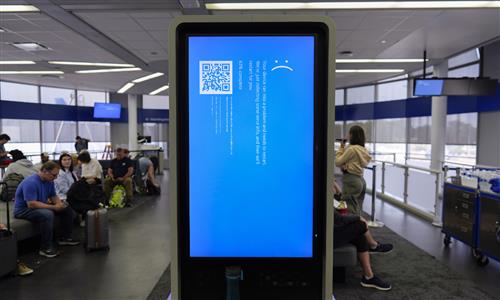Microsoft products again experience global outage after ‘blue screen of death’ incident, raising cybersecurity concerns

Microsoft Photo: VCG
Some of Microsoft's 365 services experienced problems again, blocking customers from using cloud-based software programs including Word, PowerPoint and Outlook. This is the second outage in a month, after a global blue screen failure occurred in Microsoft's Windows operating system on July 19, which caused large numbers of users worldwide to experience computer crashes.
Analysts said that the latest incident once again highlights the importance of security and sounds the alarm on global cybersecurity. It is drawing renewed global attention to digital security issues and making people reflect on how to reduce the risk of over-dependence on a single company under the oligopoly of a few tech companies.
On Tuesday morning (US time), reports of outages with Microsoft 365 programs spiked on DownDetector, an online outage tracker, saying that "user reports indicate possible problems at Microsoft 365."
Microsoft later reported a major Azure outage, affecting services like Microsoft 365, Outlook and more. The company said that the problems affected its networks around the world. The outage was cleared up by Tuesday afternoon (US time), with Microsoft saying its "Microsoft 365 admin center and Azure cloud service were available as of 6 pm (GMT-4:00)."
When millions of devices and services worldwide are affected by an outage caused by a single company, countries or companies that have their own technology systems and products are better able to withstand such risks, Wang Peng, an associate research fellow at the Beijing Academy of Social Sciences, told the Global Times on Wednesday.
"The oligopoly of technology giants, such as Microsoft, has been exposed in such incidents. Over-reliance on the technology and services of a single company can lead to severe shocks to entire industries and even national economies," said Wang.
Wang noted that dispersing risks by diversifying suppliers and establishing backup systems have become issues that enterprises and countries need to consider seriously.
Chinese industry experts pointed out that there was a limited impact from Microsoft's incidents in China, largely due to the country's early initiation of a substitution plan involving domestic hardware, operating systems and application software.
They also noted that China has increased its technological independence - not 100 percent of its own accord - in the context of the US-initiated technology war against China.
However, while such suppression indeed hinders some foreign equipment and software from entering the Chinese market, "the push from the US facilitated China's rapid technological development as Chinese companies were forced to develop their own technologies and equipment," an industry insider from a domestic cybersecurity company told the Global Times on Wednesday, speaking on condition of anonymity.
Wang also called for global cooperation in cybersecurity, as it is not only about the interests of individual companies or countries but a common global challenge.
The internet information field has become an important part of modern infrastructure. Any cybersecurity threat can have a broad impact on a country and its society. Microsoft's "blue screen of death" in mid-July caused reported disruptions in civil aviation, railways, hospitals, hotels, banking systems and other fields in many countries.
"The outage of services offered by Microsoft, a world-leading tech company, quickly spread to multiple industries and countries, showing the vulnerability of the global internet infrastructure," Wang said.
According to media reports, the previous disruption was caused by a Windows software update released by US cybersecurity technology firm CrowdStrike.



